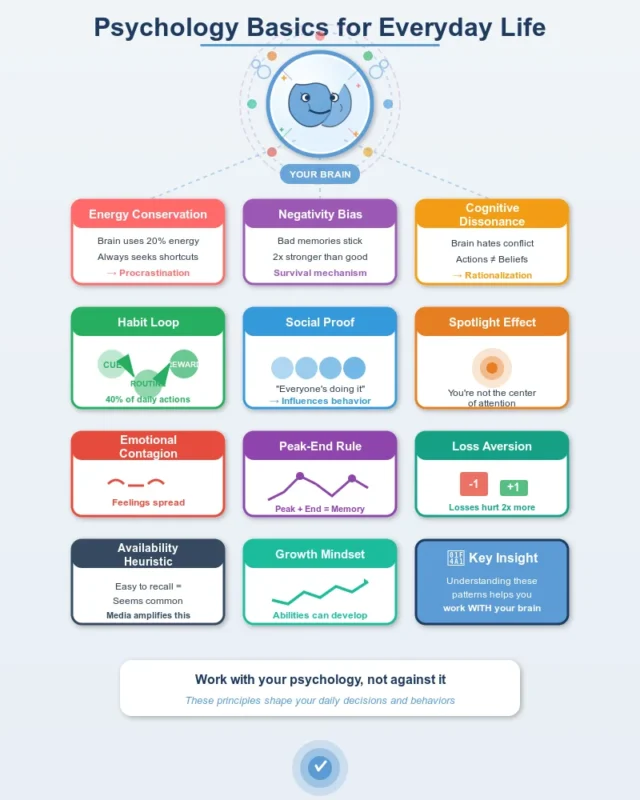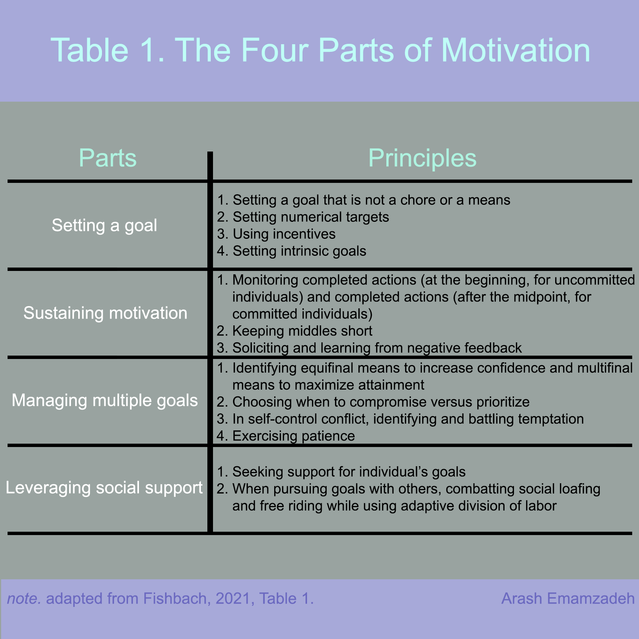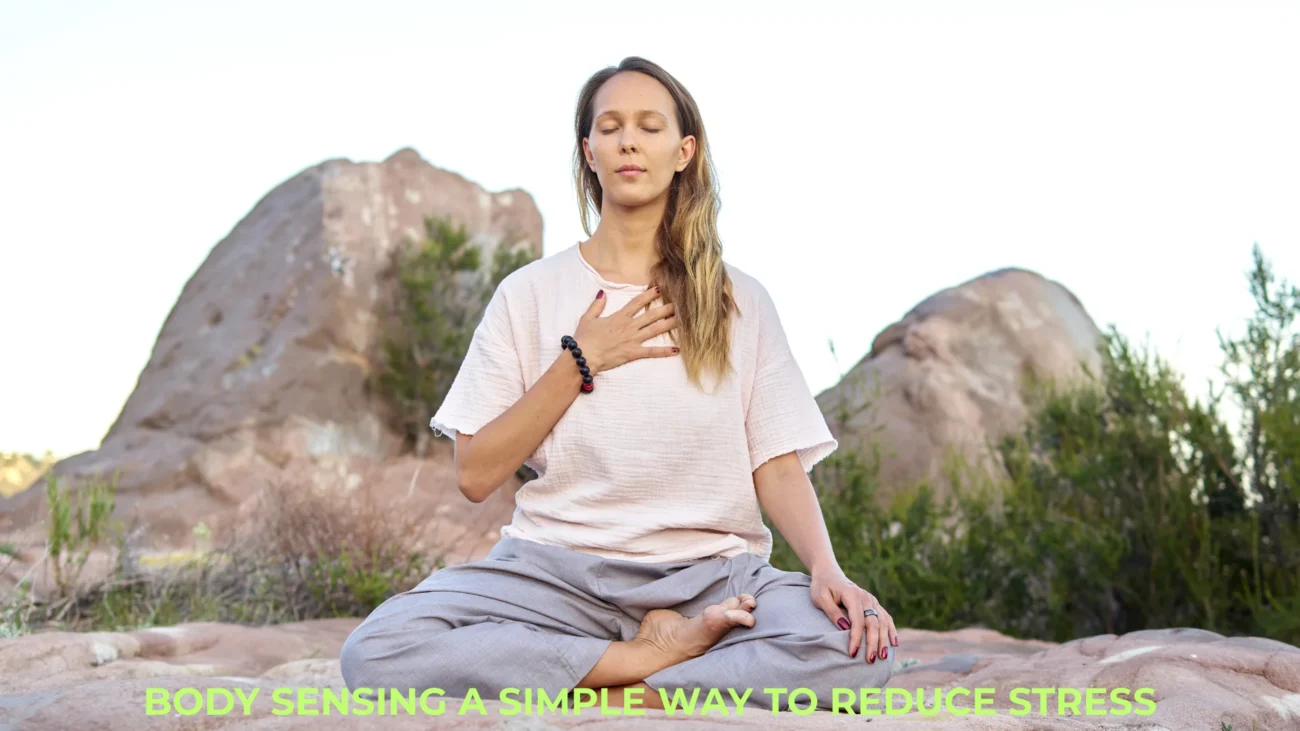Blog
Psychology Basics 4 Everyday Life

Simple Tricks to Understand Yourself and Others Better

How Psychology Basics Shapes Your Lifestyle
Psychology isn’t just about thoughts and emotions — it directly influences daily lifestyle choices like how you respond to stress, how you build habits, how you maintain discipline, and even how you treat others. When you understand the patterns behind your behavior, you gain the power to adjust your lifestyle instead of living on autopilot.
Why Bother with Psychology in Your Daily Routine?
Ever wonder why you snap at your partner after a rough day at work, or why you can’t resist scrolling through social media even when you’re exhausted? That’s psychology at play, sneaking into every corner of your life. Psychology Basics isn’t just for therapists or academics—it’s a handy toolkit for navigating relationships, boosting your mood, and making smarter choices. In this post, I’ll break down some basic psychology concepts you can apply right away, without needing a degree. We’ll cover emotions, thinking traps, social vibes, and motivation hacks. By the end, you’ll feel like you’ve got a secret edge in handling life’s little curveballs. Let’s dive in and make sense of the mind games we all play.
Getting a Grip on Your Emotions
Emotions drive so much of what we do, yet they often feel like wild horses running amok. Think about it: one minute you’re thrilled about a promotion, the next you’re fuming over a traffic jam. A key idea here is emotional intelligence, which means recognizing your feelings and managing them effectively—it’s a game-changer for your mental health. For instance, when anger bubbles up during an argument, take a deep breath and label what you’re feeling—like saying to yourself, “I’m frustrated because I feel unheard.” This simple step can calm things down and lead to better talks. People with higher emotional intelligence handle stress better, build stronger bonds with others, and support their overall mental health in the long run. [1] It’s like having a remote control for your mood—pretty empowering, right?

Spotting Those Sneaky Thinking Biases
Our brains love shortcuts, but sometimes they lead us astray with cognitive biases. Confirmation bias is a classic one: you seek out info that backs up what you already believe, ignoring the rest. Ever argued politics with a friend and only remembered facts that support your side? That’s it in action. To counter it, challenge yourself to look at the other viewpoint next time—maybe read an article from a different source. Another fun one is the Dunning-Kruger effect, where folks overestimate their skills in areas they’re clueless about. Remember that viral video of someone botching a simple task but acting like an expert? Laughing at it might remind you to stay humble and keep learning. Recognizing these biases helps you make fairer decisions, whether picking a new phone or voting in an election. [2]

Navigating Social Interactions Like a Pro
Humans are social creatures, and psychology basics offers gems for smoother interactions. Take the concept of mirroring: subtly copying someone’s body language can build rapport. If your boss leans forward during a meeting, try doing the same—it signals you’re on the same wavelength. But don’t overdo it, or you’ll come off as creepy! Social proof is another biggie, where we follow the crowd. That’s why reviews sway our buys or why we join trends. In everyday life, use it wisely—like encouraging kids to eat veggies by showing how their friends do it. Building positive relationships also ties into knowing our need for belonging, as humans thrive on connections. A quick call to a friend can lift your spirits more than you think. [3]

How to Increase Self-Motivation | Psychology Today
Boosting Motivation When You Feel Stuck
Motivation isn’t magic; it’s psychology in motion. Ever put off a task until the last minute? That’s procrastination, often fueled by fear of failure or overwhelming goals. Break it down into tiny steps—like cleaning just one drawer instead of the whole room—and you’ll build momentum. The psychology behind habits is gold too: link a new routine to an existing one, such as flossing right after brushing. Over time, it sticks without much effort. Sense of purpose amps this up; remind yourself why a goal matters, like exercising for more energy to play with your kids. Tips from experts suggest harnessing morning energy when willpower is high, so tackle tough stuff early. [4] It’s hilarious how our brains trick us into thinking Netflix is more urgent than that report, but with these hacks, you can outsmart it.
Applying Psychology to Communication
Good communication turns chaos into clarity, and psychology lights the way. Active listening is key: instead of planning your reply, focus on what the other person says and paraphrase it back. “So you’re saying you’re upset because I forgot our plans?” This shows you care and cuts misunderstandings. Nonverbal cues matter too—crossed arms might signal defensiveness, even if your words are friendly. In ads or politics, psychology plays huge roles, like using scarcity (“limited time offer!”) to spur action. In your life, apply it by framing requests positively: “Let’s try this new recipe together” beats “Stop eating junk.” These tweaks can make chats more productive and fun. [5]
Handling Stress with Psychological Tools
Stress sneaks up like an uninvited guest, but basic psych tools can show it the door. Mindfulness, for one, means staying present without judging. A quick five-minute breathing exercise—inhale for four, hold for four, exhale for four—can reset your nervous system. Cognitive restructuring flips negative thoughts: change “I’ll never finish this” to “I’ve handled tough stuff before.” Gratitude journaling, writing three good things daily, shifts focus from woes to wins. It’s backed by research showing it boosts happiness. [6] Imagine turning a bad day around just by noting the coffee that hit the spot or a kind word from a stranger—small but mighty.
Psychology in Decision-Making
Decisions big and small shape our days, and psychology helps us choose wisely. The sunk cost fallacy traps us into sticking with bad choices because we’ve invested time or money—like watching a lousy movie to the end. Recognize it and cut losses early. Prospect theory explains why losses sting more than gains feel good, so weigh risks carefully. For productivity, the Pomodoro technique—work 25 minutes, break five—leverages our attention spans. In everyday picks, like grocery shopping, avoid hunger to dodge impulse buys. These insights turn decision-making from a gamble into a strategy.
Wrapping It Up: Make Psychology Your Ally
Psychology basics aren’t about overanalyzing every moment; they’re about living smarter and kinder. From taming emotions to dodging biases and firing up motivation, these ideas pop up in work, love, and play. Next time you face a hiccup, pause and think, “What’s the psych angle here?” You might surprise yourself with how much easier things get. If you’ve got a favorite psych tip that’s changed your life, share it below—I’d love to hear! Remember, understanding the mind is a journey, not a destination, and it’s one worth taking for a happier you.
References
[1] Improving Emotional Intelligence (EQ): Expert Guide – HelpGuide.org – https://www.helpguide.org/mental-health/wellbeing/emotional-intelligence-eq
[2] List of Cognitive Biases and Heuristics – The Decision Lab – https://thedecisionlab.com/biases
[3] Social Connection – CDC – https://www.cdc.gov/social-connectedness/about/index.html
[4] Five Temptations That Actually Boost Your Willpower – https://www.psychologytoday.com/us/blog/the-science-willpower/201204/five-temptations-actually-boost-your-willpower
[5] Active Listening: Definition, Skills, & Benefits – Simply Psychology –
[6] Gratitude enhances health, brings happiness — and may even …
[7] The Sunk Cost Fallacy – The Decision Lab.












